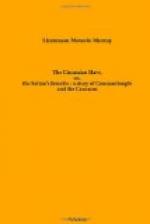“You seem trouble this morning,” said Komel’s father, observing his mood. “Are you not well?”
“No, not exactly well,” replied Selim; “indeed a strange dream seems to come over me while I look about me here—this mountain air, these surrounding hills, the distant view of the sea, have I ever seen these things before, or is it some troubled action of the brain that oppresses me with undefined recollections?”
“Come in and partake of our morning meal; that will refresh you,” said the mountaineer.
“Thanks; yes, I will join you at once,” he replied, but turned away thoughtfully.
With the earliest morning, Aphiz was again at the cottage and by Komel’s side. O, how beautiful did she look to him now, once more attired in her simple dress of a mountaineer’s daughter. No tongue could describe the fondness of his heart, or the dear truthfulness of her own expressive face when they met thus again. Their hearts were too full, far too full for words, and they wandered away together to old familiar scenes and spots in silence, save that their sympathetic souls were all the while communing with each other. At last they came to a spot from whence the lovely valley opened just below them, when suddenly Aphiz pointed to a projecting and dead limb of a tree far beneath them, and asked Komel if she remembered the scene of the hawk and dove.
“Alas! dear Aphiz, but too well. It was indeed an unheeded warning.”
“But the dove is once more restored now, dearest, and we must look only for happy omens.”
“I have seen so much of sadness, Aphiz,” she answered, “that I shall only the more dearly prize the quiet peacefulness of our native hills.”
“Thus too is it with me. A few months of excitement, toil, danger and unhappiness abroad, has endeared each spot that we have loved in our childhood still more strongly to me.”
“Then shall good come out of evil, dear Aphiz, inasmuch as we shall now live content.”
“Have you seen Captain Selim this morning, Komel?” he asked.
“Yes, and I fear he is ill, some heavy weight seems to be upon his heart.”
“Let us seek him then, for we owe all to his manliness and courage.”
As the twilight hour once crept over hill and valley, the evening meal was spread on the open lawn before the cottage, and when this was over, all sat there and told of the events that had passed, and each other’s experiences, for the few past months, during which time Komel had remained a prisoner at the Sultan’s palace. Of Selim, they knew only so much of his history as was connected with themselves, and he was asked to relate his story.
“Mine has been a life of little interest,” he said, “save to myself alone. Of my birth and parentage I know nothing, and my earliest recollections carry me back to the period when I was a boy on board a Trebizond merchantman, at a time when I was just recovering from what is called the Asia fever, a malady that often attacks those who come from the north of the Black Sea to the Asia coast to live. This fever leaves the invalid deranged for weeks, and when he recovers from it, he is like an infant and obliged from that hour to cultivate his brain as from earliest childhood, and he can recall nothing of the past. Thus I lost the years of my life up to the age of eight or nine.




